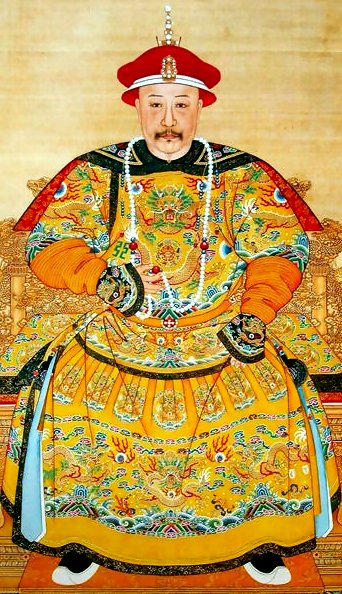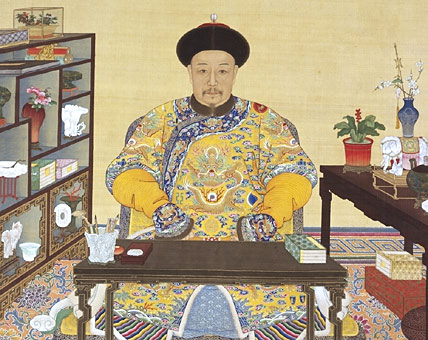<Back to Index>
- Mathematician Max Dehn, 1878
- Novelist Robert Louis Balfour Stevenson, 1850
- Emperor of China Jiaqing, 1760
PAGE SPONSOR


The Jiaqing Emperor (13 November 1760 – 2 September 1820) was the sixth emperor of the Manchu-led Qing dynasty, and the fifth Qing emperor to rule over China proper, from 1796 to 1820.
Son of the famous Qianlong Emperor, he is remembered for his prosecution of Heshen, the infamously corrupt favourite of Qianlong, as well as for attempts to restore the state and curb the smuggling of opium inside China. He was born at the Old Summer Palace, 8 km (5 mi) northwest of the walls of Beijing,
and was given the name Yongyan, changed into Yongyan when he
became emperor: the first character of his private name was changed
from 永 to 顒, both pronounced Yong, as the former is used commonly. This
novelty was introduced by his father the Qianlong Emperor who thought it not proper to use a common character in the emperor's private name due to the long-standing practice of naming taboo. He was the fifteenth son of the Qianlong Emperor. His mother was a Han Chinese concubine of the second rank Ling, who became a favorite of Qianlong. She was posthumously made Empress Xiao Yi Chun when her son became emperor. She was the daughter of Wei
Qingtai, an official in the Qing administration whose Han Chinese family
had long been integrated in the Manchu elites. In 1818 Emperor Jiaqing
made his mother's family officially Manchu, and changed their Chinese
family name Wei into the Manchu clan name Weigiya. After
the first two original choices for heir to the throne succumbed early
to disease, in December 1773 Yongyan was secretly chosen by Qianlong to
be the next emperor. In 1789 he was made Prince of the 1st rank Jia. At the end of his reign, Qianlong worked closely with a Manchu government minister called Heshen.
Prince Jia hated the notoriously corrupt Heshen for his abuse of power,
and vowed to punish the minister once he became emperor. In
October 1795, in the 60th year of his reign, Emperor Qianlong announced
his intention to abdicate in favor of Prince Jia, because he did not
think it proper to rule longer than his grandfather, the late Kangxi Emperor. Prince Jia acceded to the throne and proclaimed the era name of Jiaqing in
February 1796. For the next three years however, Jiaqing ruled as
Emperor in name only. Decisions were made by his father, the Retired Emperor Qianlong. With
the death of Qianlong at the beginning of February 1799, Jiaqing took
control of the government and prosecuted Heshen. Heshen was charged
with corruption and abuse of power. He was stripped of his titles and
properties, and ordered to commit suicide. Heshen's daughter-in-law,
Princess He Xiao, a sister of the new emperor, was spared from
punishment and given a few properties from Heshen's estates. At the time, the empire was facing internal disorder, most importantly the large-scale White Lotus Rebellion (1796 - 1804),
as well as an empty treasury. Emperor Jiaqing engaged in the
pacification of the empire and the quelling of rebellions. He
endeavored to bring China back to its 18th-century prosperity and
power. However, due, in part, to large outflows of silver from the country as payment for the opium smuggled into China from British India, the economy declined. On 2 September 1820, the Jiaqing Emperor died at the Rehe (Jehol) Traveling Palace, 230 km (140 mi) northeast of Beijing, where the imperial court was in summer quarters. The Draft History of Qing did
not record a cause of death. Some have alleged that he died after being
struck by lightning, but others prefer the theory that he died of a stroke as the emperor was quite obese. He was succeeded by his second son, the Daoguang Emperor. Renzong was interred amidst the Western Qing Tombs, 120 km (75 mi) southwest of Beijing, in the Changling (meaning "Splendid tomb") mausoleum complex.